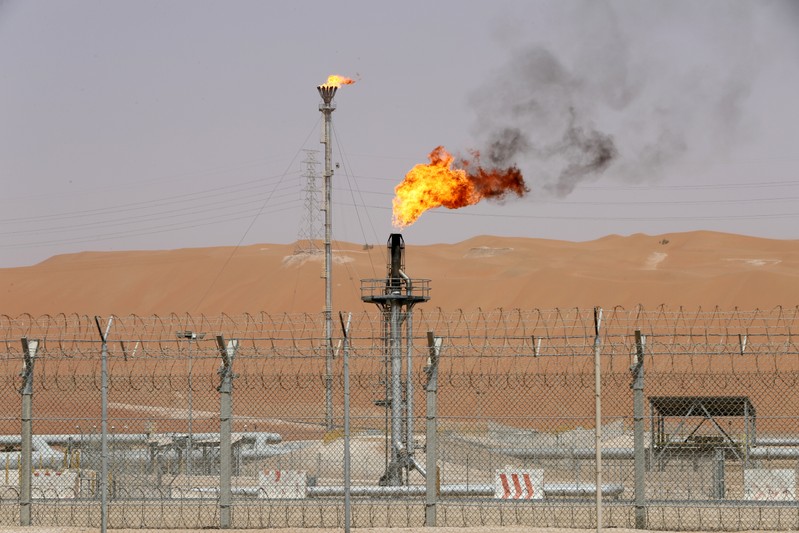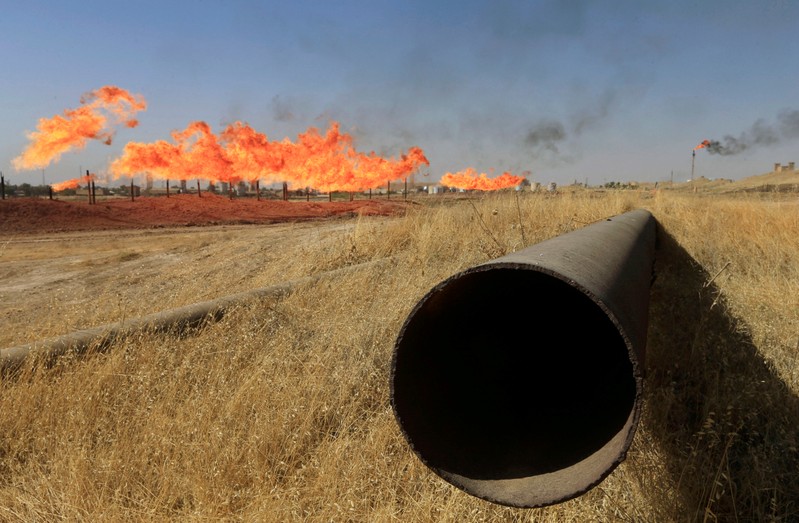
FILE PHOTO: Flames are seen at the production facility of Saudi Aramco’s Shaybah oilfield in the Empty Quarter, Saudi Arabia May 22, 2018. . REUTERS/Ahmed Jadallah/File Photo
November 11, 2018
By Rania El Gamal and Dmitry Zhdannikov
ABU DHABI (Reuters) – Saudi Arabia is discussing a proposal that could see OPEC and non-OPEC oil producers cut output by up to 1 million barrels per day, two sources told Reuters on Sunday, as the world’s top oil exporter grapples with a drop in crude prices.
The sources said any such deal would depend on factors including the level of Iranian exports after the United States imposed sanctions on Tehran but granted Iran’s top oil buyers waivers to continue buying oil.
Riyadh was surprised by the waivers granted to customers such as China and India, a move which hit oil prices, at least three industry and OPEC sources told Reuters.
Now Saudi Arabia wants to act to prevent a further slide in prices which fell below $70 a barrel on Friday, and is leading discussions on cutting oil output next year, the sources said.
Under a deal set to expire at the end of the year, OPEC and non-OPEC producers agreed to curb output by around 1.8 million bpd.
But producers ended up cutting more – partly due to unexpected outages in Venezuela, Libya and Angola – and so agreed in June to limit cuts to the agreed level, meaning restoring about 1 million bpd in output.
OPEC and its allies will meet in Vienna on Dec. 6-7 to decide on output policy for 2019.
“There is a general discussion about this (cut). But the question is how much is needed to be reduced by the market,” one of the sources said ahead of a meeting by a monitoring committee in Abu Dhabi on Sunday attended by top producers Saudi Arabia and Russia.
“No one expected the waivers. Saudi Arabia wants to at least put a floor under oil prices. No one wants a free fall in prices,” the source added.
Kazakh deputy energy minister Magzum Mirzagaliyev told reporters in Abu Dhabi that he understood Saudi Arabia was suggesting using August-October output levels as a baseline for determining cuts.
Brent <LCOc1> crude on Friday fell 47 cents, or 0.7 percent, to settle at $70.18 a barrel. It lost about 3.6 percent on the week and has shed more than 15 percent this quarter. [O/R]
Washington gave 180-day waivers to eight Iranian oil buyers – China, India, South Korea, Japan, Italy, Greece, Taiwan and Turkey. This group takes as much as three-quarters of Iran’s seaborne oil exports, trade data shows.
The U.S. administration has vowed to reduce Iranian oil exports to zero and U.S. President Donald Trump has put pressure on Saudi Arabia to raise output to cool the market.
Iran’s crude exports could fall to little more than 1 million bpd in November, roughly a third of their mid-2018 peak. But traders and analysts say that figure could rise from December as importers use their waivers.
Saudi Energy Minister Khalid al-Falih said last month the kingdom would pump 11 million bpd in November, up from 10.7 million bpd in October.
He also said there could be a need for intervention to reduce oil stockpiles after increases in recent months.
U.S. sanctions on Iran are aimed at curbing Tehran’s nuclear and missile programs as well as its support for proxy forces in Yemen, Syria, Lebanon and other parts of the Middle East.
(Additional reporting by Maha El Dahan, Stanley Carvalho, Tuqa Khalid and Nafisa Eltahir; editing by Jason Neely)

